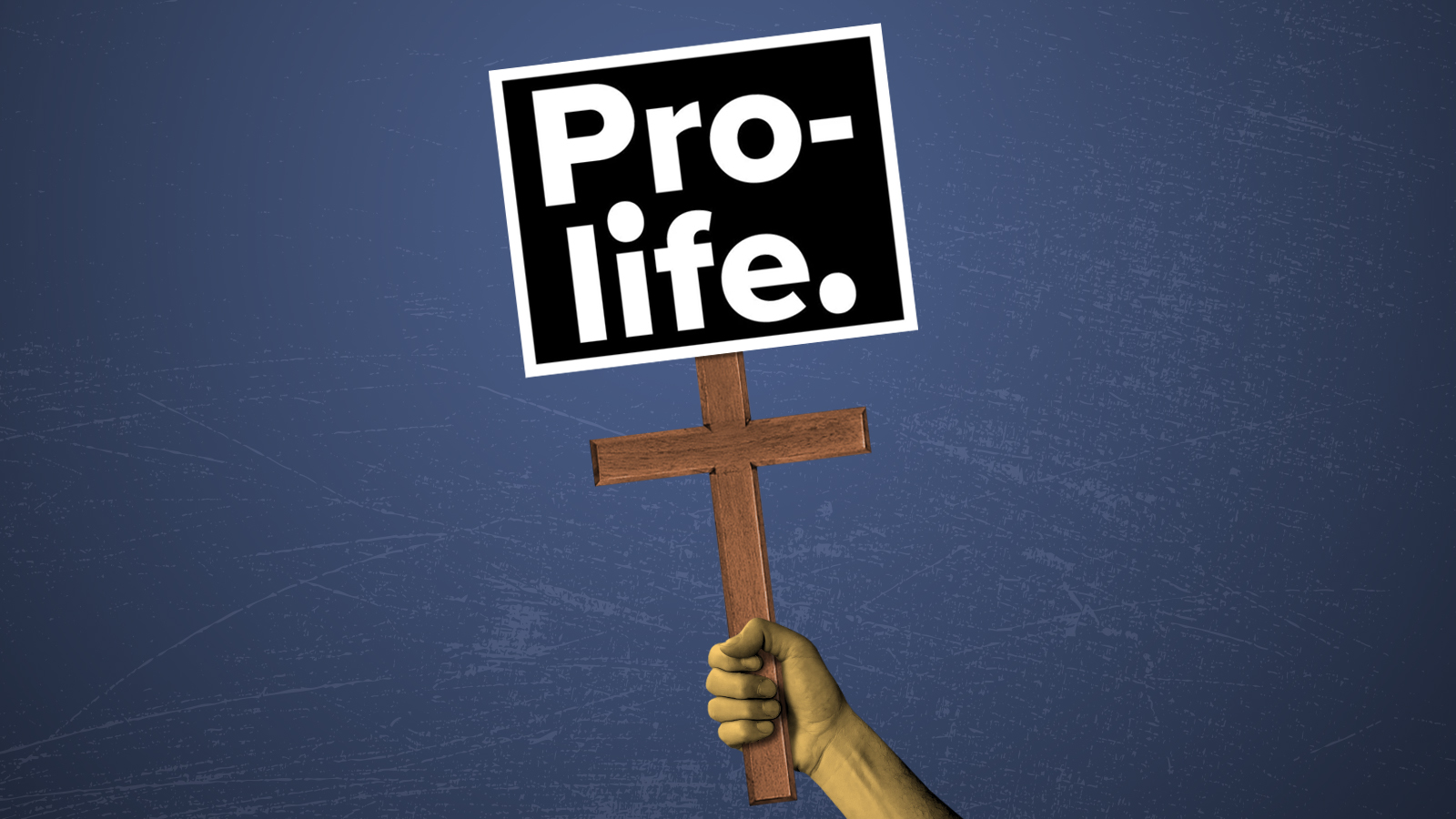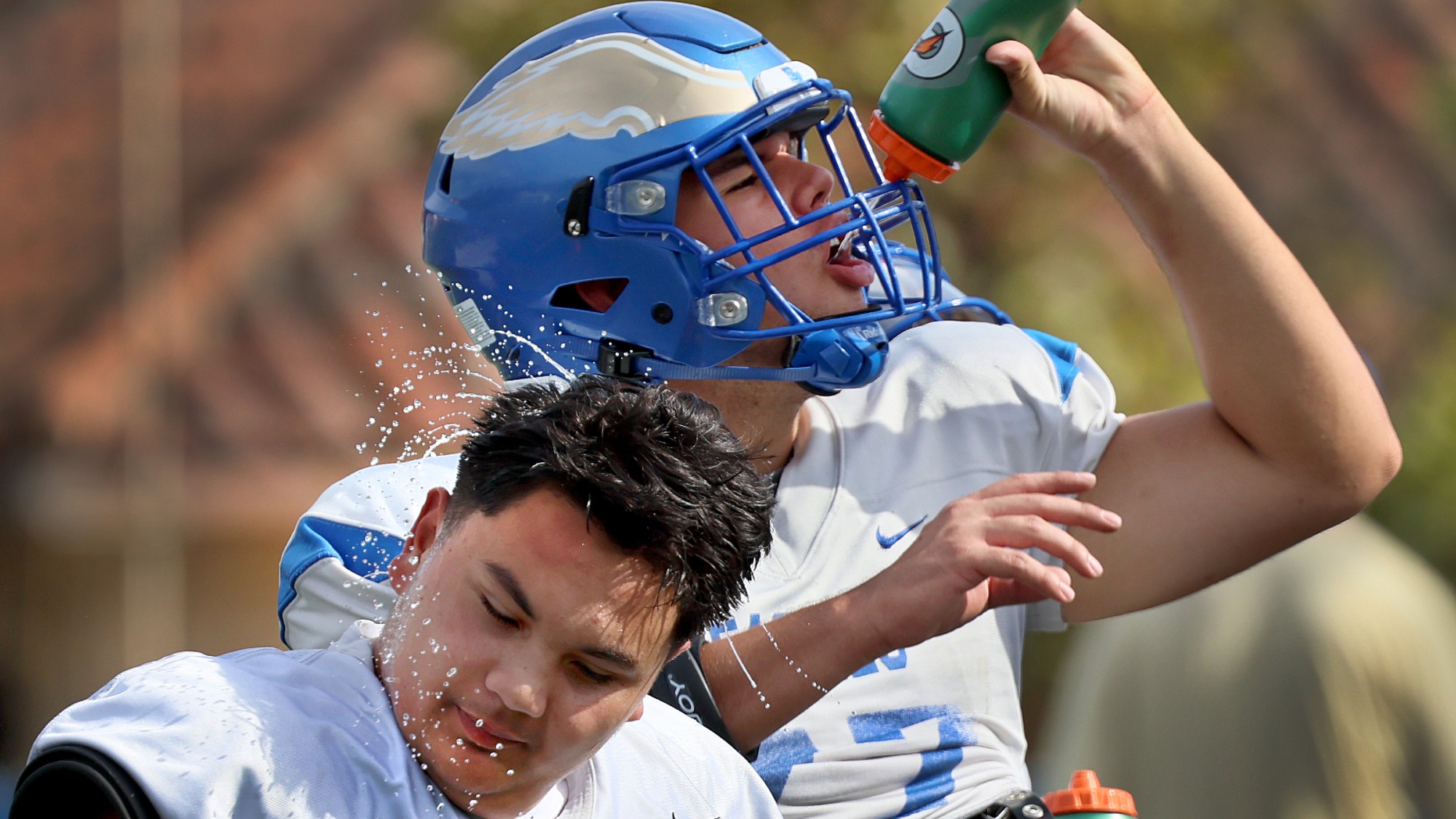Catholic bishops are making American Catholicism a single-issue religion
Does the Catholic Church care about anything other than abortion?


A free daily email with the biggest news stories of the day – and the best features from TheWeek.com
You are now subscribed
Your newsletter sign-up was successful
Catholic leaders like to explain that Roman Catholicism doesn't fit comfortably in any political party, and doctrinally, that is true.
The Catholic Church has had a strong history of supporting labor movements since Pope Leo XIII's 1891 encyclical Rerum novarum (Rights and Duties of Capital and Labor), has taught that artificial contraception is sinful since Pope Paul VI's 1968 encyclical Humanae vitae, condemns both abortion and capital punishment, strongly supports immigration and finding safe harbor for refugees, opposes same-sex marriage and civil unions, and encourages strong global measures to mitigate climate change. There's plenty for Democrats and Republicans to love and hate.
But the American bishops on Friday took a big step toward making the U.S. Catholic Church a one-issue denomination. That one issue, of course, is abortion. And the apparent preferred mechanism to enforce doctrinal purity on abortion, according to a majority of U.S. bishops who voted by secret ballot last week, is threatening to deny errant politicians the Eucharist. The clear genesis of this push was the election of America's second Catholic president, Joe Biden.
The Week
Escape your echo chamber. Get the facts behind the news, plus analysis from multiple perspectives.

Sign up for The Week's Free Newsletters
From our morning news briefing to a weekly Good News Newsletter, get the best of The Week delivered directly to your inbox.
From our morning news briefing to a weekly Good News Newsletter, get the best of The Week delivered directly to your inbox.
The bishops, gathered virtually for the spring meeting of the U.S. Conference of Catholic Bishops (USCCB), voted 168 to 55, with 6 abstentions, to push forward with a document on the Eucharist that, in its draft form, would encourage bishops to deny the Eucharist to Catholic political figures who support legal access to abortion.
The Vatican had publicly urged the USCCB not to take this step without finding consensus. Pope Francis, who abhors abortion, has made his views fairly clear that the Eucharist, which Catholics believe is substantively the body and blood of Jesus, is "not a prize for the perfect but a powerful medicine and nourishment for the weak," as he wrote in his apostolic exhortation Evangelii gaudium (The Joy of the Gospel).
The pope reiterated that point on June 6. Jesus gave us the Eucharist on the night Judas, who "eats with Him, who dips the morsel in the same plate, is betraying Him," he told a crowd in St. Peter's Square. And Jesus does the same for us, the pope continued. "He knows that we need it, because the Eucharist is not the reward of saints, but the bread of sinners. This is why he exhorts us: 'Do not be afraid! Take and eat.'"
The U.S. bishops who support denying Democratic politicians Communion say they are doing so because having prominent Catholics, especially those involved in policy, participate in the Mass while publicly upholding the legal right to abortion gives the sense that the church sanctions or at least tolerates abortion. "There is a special obligation of those who are in leadership because of their public visibility," Fort Wayne-South Bend Bishop Kevin Rhaodes, chairman of the USCCB doctrinal committee that will now write the document on the Eucharist, said after the vote.
A free daily email with the biggest news stories of the day – and the best features from TheWeek.com
But deploying what amounts to the Catholic nuclear option only on abortion signals that abortion is the only issue the Catholic Church really cares about.
Steven Millies, a professor of public theology at the Catholic Theological Union in Chicago, notes that nobody is accusing Biden of performing or procuring an abortion, just abiding by his oath to uphold the Constitution — which, under current Supreme Court precedent, recognizes a legal right to abortion.
Millies points to the counterexample of Texas Gov. Greg Abbott (R), another prominent Catholic, who has declined to halt 18 executions on his watch since Pope Francis increased the church's official opposition to capital punishment. Abbott's actions are much more proximate to capital punishment than Biden's are to abortion, he said, and no bishops are calling for him to be denied Communion.
Another prominent Catholic Republican, former Attorney General Bill Barr, revived the federal death penalty after a 17-year break, then pushed through 13 executions in rapid succession. The day between the sixth and seventh executions last September, Barr was awarded the National Catholic Prayer Breakfast's Christifideles Laici (Faithful Christian Laity) Award. The Supreme Court has a 6-3 Catholic majority, but the justices allowed all those executions to proceed.
At the USCCB's 2018 spring meeting, a bishop recommended applying "canonical penalties" on Catholics who participated in the Trump administration's family separation immigration policy, Jack Jenkins recounts at Religion News Service. "The proposal did not gain traction, however, and did not trigger calls for a Eucharistic document."
With abortion, the bishops seem willing to alienate about half the U.S. church to make a political point. Because even if the bishops follow through in the November meeting and issue a document encouraging each other to bar Biden from receiving Holy Communion, Washington Cardinal Wilton Gregory has made clear he will not. And unless the bishops unanimously adopt the document on the Eucharist, which seems unlikely, it would need sign-off from the Vatican to take effect. That seems even less likely.
Sixty Catholic House Democrats issued a response to the USCCB's vote, laying out their vision of what supporting human life and dignity looks like and "solemnly" urging the bishops to "not move forward and deny this most holy of all sacraments, the source and the summit of the whole work of the gospel over one issue." A Pew Research survey in March found that 67 percent of U.S. Catholics believe Biden should be allowed to receive Communion regardless of his abortion politics.
"Any effort by this conference to move in support of the categorical exclusion of Catholic political leaders based on their public policy will thrust the bishops of our nation into the very heart of the toxic partisan strife, which has distorted our own political culture and crippled meaningful dialogue," Cardinal Joseph Tobin of New Jersey said during the USCCB debate.
There's also the elephant in the room: the bishops' own moral credibility.
After decades of sexual abuse facilitated by bishops came to light in 2002 and 2003, the bishops should have emerged "humbled," with "a long period of atonement and a commitment to holding themselves accountable," tweeted Fr. Jeremy Zipple, a Catholic priest and Jesuit. "Instead, they quickly pivoted to a culture war fight over gay marriage then ObamaCare," and now this, wrecking the "U.S. church's credibility."
The Southern Baptist Convention, the largest U.S. Protestant denomination, also met last week, and its delegates stepped back from ramping up its cultural warfare. "Whenever the church gets in bed with politics, the church gets pregnant," outgoing SBC leader J.D. Greear said in his final presidential address. "And our offspring does not look like our Father in Heaven."
Baptists and other evangelicals, historically, have long valued the separation of church and state more than the Catholic Church, which is headquartered in its own sovereign city state and used to control European empires. But alienating one of two American political parties is bad politics, especially in a moment where the president, Supreme Court majority, and House speaker are all Catholic.
More to the point, it seems like bad flock-tending and bad religion.
In the same letter Pope Francis said the Eucharist isn't "a prize for the perfect" but "nourishment for the weak," he added of his fellow pastors: "Frequently, we act as arbiters of grace rather than its facilitators. But the Church is not a tollhouse; it is the house of the Father, where there is a place for everyone, with all their problems." In America, we'll see.
Peter has worked as a news and culture writer and editor at The Week since the site's launch in 2008. He covers politics, world affairs, religion and cultural currents. His journalism career began as a copy editor at a financial newswire and has included editorial positions at The New York Times Magazine, Facts on File, and Oregon State University.
-
 ‘Restaurateurs have become millionaires’
‘Restaurateurs have become millionaires’Instant Opinion Opinion, comment and editorials of the day
-
 Earth is rapidly approaching a ‘hothouse’ trajectory of warming
Earth is rapidly approaching a ‘hothouse’ trajectory of warmingThe explainer It may become impossible to fix
-
 Health insurance: Premiums soar as ACA subsidies end
Health insurance: Premiums soar as ACA subsidies endFeature 1.4 million people have dropped coverage
-
 The ‘mad king’: has Trump finally lost it?
The ‘mad king’: has Trump finally lost it?Talking Point Rambling speeches, wind turbine obsession, and an ‘unhinged’ letter to Norway’s prime minister have caused concern whether the rest of his term is ‘sustainable’
-
 The billionaires’ wealth tax: a catastrophe for California?
The billionaires’ wealth tax: a catastrophe for California?Talking Point Peter Thiel and Larry Page preparing to change state residency
-
 Bari Weiss’ ‘60 Minutes’ scandal is about more than one report
Bari Weiss’ ‘60 Minutes’ scandal is about more than one reportIN THE SPOTLIGHT By blocking an approved segment on a controversial prison holding US deportees in El Salvador, the editor-in-chief of CBS News has become the main story
-
 Memo signals Trump review of 233k refugees
Memo signals Trump review of 233k refugeesSpeed Read The memo also ordered all green card applications for the refugees to be halted
-
 Has Zohran Mamdani shown the Democrats how to win again?
Has Zohran Mamdani shown the Democrats how to win again?Today’s Big Question New York City mayoral election touted as victory for left-wing populists but moderate centrist wins elsewhere present more complex path for Democratic Party
-
 Millions turn out for anti-Trump ‘No Kings’ rallies
Millions turn out for anti-Trump ‘No Kings’ ralliesSpeed Read An estimated 7 million people participated, 2 million more than at the first ‘No Kings’ protest in June
-
 Democrats: Harris and Biden’s blame game
Democrats: Harris and Biden’s blame gameFeature Kamala Harris’ new memoir reveals frustrations over Biden’s reelection bid and her time as vice president
-
 ‘We must empower young athletes with the knowledge to stay safe’
‘We must empower young athletes with the knowledge to stay safe’Instant Opinion Opinion, comment and editorials of the day
